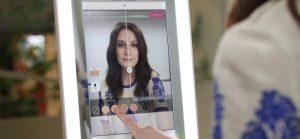2023-01-23

Hilo shows the effect that makeup would have on your face
by Startup Montréal
14 August 2022
14 August 2022

This article was originally published on infobref.com
Before buying an eyeglass frame or a new cosmetic product, it is natural to want to try it on in a store. This requires someone to take care of us and spend time with us. When no store employee is available, the smart mirrors of Hilo, a Montreal-based start-up, take over. They allow you to virtually try on, in real time, and buy directly the product that suits you.
The problem Hilo Solutions, which does business as Hilo Smart Mirror, is addressing is the lack of staffing in retail stores.
“The people who interact with customers and charge them are often in positions that don’t pay very well, and are difficult to recruit for,” says Zack Elorfi, founder of Hilo.
Hilo’s Smart Mirror solution is a technological substitute in the form of smart mirrors: in addition to reflecting the image, they are also touch screens and are equipped with a camera and software.
In the store, these mirrors are built into a wall or placed on a table or counter. If no salesperson is available to serve a customer, she sits in front of a mirror. The mirror reflects her face, but also superimposes a selection of products – such as cosmetics, facial accessories or eyeglass frames.
The customer can select a product herself. The mirror then adds it in real time to the customer’s image: she sees herself as if she were actually wearing the product. The simulation gives an accurate image. It allows the customer to form, at her own pace, a good idea of the product that suits her best. A Hilo smart mirror showing one half of the face with a makeup product (simulated image) and the other without (real image).

When she finds a product she likes, she can buy it by presenting her credit card. If the product is available in the store, she can then pick it up at the reception desk on her way out. If not, she can have it delivered to her home.
The customer is interested in a product, but not ready to buy it right away? She can then take a picture of her face “wearing” the product, and send this picture to herself by email. The merchant keeps this information. “This allows him to build up a database of qualified prospects, who have already shown a strong interest in certain products,” says Zack Elorfi.
Hilo’s business model is to charge stores each month for a turnkey service that includes the rental of the mirror, the license to use the software that powers it, and technical support.
“Our solution is perfectly suited to selling products that are worn from the neck up,” says Zack Elorfi. We serve three market segments: cosmetics, hair products and eyewear.”
Currently, Hilo Smart Mirror already has 4 initial paying customers, who have each deployed between 10 and 100 mirrors in Canada or the United States. Kenra Professional, a hair product manufacturer owned by German company Henkel, is one of the customer companies.
Founded less than three years ago, Hilo employs a permanent base of five full-time staff, and hires consultants on a project basis.
“We do the conception, design and prototyping of the devices in Montreal, then the quality control and packaging for shipment to our customers,” says Zack Elorfi.
Hilo is one of 20 young SMEs selected this year in the Bourse+ program of Startup Montreal.
Next steps for Hilo Smart Mirror:
Its founder wants to bring the assembly of the mirrors back to Montreal, so that they are classified as “made in Canada.” “This will be useful for us to support export to Europe and Asian megacities,” says Zack Elorfi.
He also plans to move to mass deployment for some customers who are currently testing the mirrors in a pilot project.